RFK Jr. blames 'media censorship', Democratic Party for flop campaign
In his first interview since dropping out, Kennedy Jr. details conversations with Trump and reveals reasons for his campaign's fail.
-

Independent presidential candidate Robert F. Kennedy Jr. announces he will suspend his presidential campaign during a news conference on Friday, August 23, 2024, in Phoenix. (AP)
Robert F. Kennedy Jr. revealed new information regarding his conversations with presidential candidate Donald Trump, in the first interview he gave after dropping out of the electoral race and endorsing the former president.
In an interview for Fox News Sunday, RFK Jr. said his campaign failed to gain traction amid the "media censorship" he experienced, hampering his chances of appearing on any news show but Fox News to market his strategy.
"It became clear to me that I did not have a path to victory," he said, adding that for 16 months, he was able to secure two interviews, compared to the 34 Ross Perot had over a period of 10 months.
"When Ross Perot ran, in the 10 months that he ran, he had 34 appearances on the networks. I had two appearances in 16 months, so I was blocked out of the networks, and I was blocked out of the debate. I had no path to victory," he maintained.
He also revealed that Trump occasionally reached out to Kennedy and his team and proposed forming a unity government before the latter dropped out.
Trump and Kennedy were reportedly in total agreement that the core issues each candidate was concerned with would still be criticized by one another, stressing that "these issues are so important and they're a way of unifying the country," referencing the Ukraine war, prevention of media censorship, and the promotion of children's health as his top issues.
RFK Jr. blasts the Democrats
Independent US presidential candidate Robert F. Kennedy Jr. announced Friday that he was suspending his campaign and endorsed Republican candidate Donald Trump, ending a bid that began in April 2023 with him as a Democrat hopeful.
Despite his early success, the political landscape shifted dramatically in recent months, with Trump surviving an assassination attempt and Biden stepping down in favor of Vice President Kamala Harris. These developments led to a decline in voter interest in Kennedy, with his support dropping to 4% nationally, according to an Ipsos poll conducted earlier in August.
He accused the Democratic Party of waging "continual legal warfare" against Trump and himself, as well as running a fraud campaign to obstruct any fair chance he had at taking office.
Kennedy's campaign had signaled a potential change in strategy in recent days, culminating in his decision to endorse Trump. It appears that Kennedy is still hoping to gain a spot in a potential Trump administration should the former president secure a win later in November.

 3 Min Read
3 Min Read








